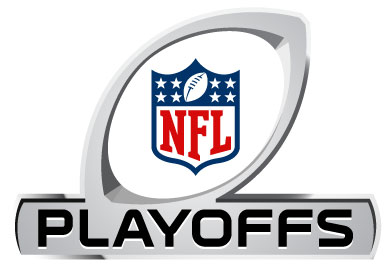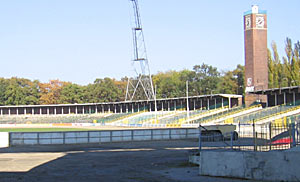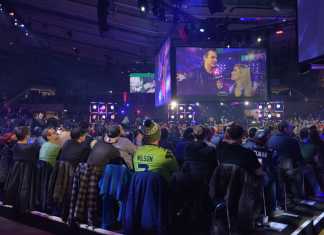On Saturday, the Buffalo Bills play at the Houston Texans (ESPN/ABC, 4:35 PM ET) and the Tennessee Titans visit the New England Patriots (CBS, 8:15 PM ET). Wild Card Weekend continues Sunday with the Minnesota Vikings at the New Orleans Saints (FOX, 1:05 PM ET) and the Seattle Seahawks traveling to face the Philadelphia Eagles (NBC, 4:40 PM ET).
The following week (January 11-12), the Baltimore Ravens (Saturday, CBS, 8:15 PM ET) and Kansas City Chiefs (Sunday, CBS, 3:05 PM ET) in the AFC and the Green Bay Packers (Sunday, FOX, 6:40 PM ET) and San Francisco 49ers (Saturday, NBC, 4:35 PM ET) in the NFC host the Divisional Playoffs. The Ravens and 49ers own home-field advantage for the Conference Championship Games (January 19) if they win their Divisional contests.
Pro Bowl 2020 (ESPN, with simulcast on ABC, 3:00 PM ET) will be played on Sunday, January 26, at Camping World Stadium in Orlando, Florida, and Super Bowl LIV will take place on Sunday, February 2 (FOX, 6:30 PM ET), at Hard Rock Stadium in Miami, Florida.
TURNAROUND TEAMS & CONSISTENT WINNERS HIGHLIGHT PLAYOFF FIELD
Six playoff teams – the BALTIMORE RAVENS (14-2), GREEN BAY PACKERS (13-3), KANSAS CITY CHIEFS (12-4), NEW ORLEANS SAINTS (13-3), NEW ENGLAND PATRIOTS (12-4) and SAN FRANCISCO 49ERS (13-3) – each won at least 12 regular-season games in 2019, tied with 2003 and 2011 for the most such teams in a single postseason in NFL history.
The combined winning percentage of the 2019 playoff field is .708 (136-56), the highest combined winning percentage among postseason teams since 2005 (.719, 138-54).
There are five new playoff teams in 2019: BUFFALO, GREEN BAY, MINNESOTA, SAN FRANCISCO and TENNESSEE.
Since 1990 – a streak of 30 consecutive seasons – at least four teams have qualified for the playoffs in every season that were not in the postseason the year before.
The teams since 1990 to make the playoffs a season after failing to qualify:
| SEASON | PLAYOFF TEAMS NOT IN PREVIOUS SEASON’S PLAYOFFS |
| 1990 | 7 (Cincinnati, Chicago, Kansas City, Los Angeles Raiders, Miami, New Orleans, Washington) |
| 1991 | 5 (Atlanta, Dallas, Denver, Detroit, New York Jets) |
| 1992 | 6 (Miami, Minnesota, Philadelphia, Pittsburgh, San Diego, San Francisco) |
| 1993 | 5 (Denver, Detroit, Green Bay, Los Angeles Raiders, New York Giants) |
| 1994 | 5 (Chicago, Cleveland, Miami, New England, San Diego) |
| 1995 | 4 (Atlanta, Buffalo, Indianapolis, Philadelphia) |
| 1996 | 5 (Carolina, Denver, Jacksonville, Minnesota, New England) |
| 1997 | 5 (Detroit, Kansas City, Miami, New York Giants, Tampa Bay) |
| 1998 | 5 (Arizona, Atlanta, Buffalo, Dallas, New York Jets) |
| 1999 | 7 (Detroit, Indianapolis, St. Louis, Seattle, Tampa Bay, Tennessee, Washington) |
| 2000 | 6 (Baltimore, Denver, New Orleans, New York Giants, Oakland, Philadelphia) |
| 2001 | 6 (Chicago, Green Bay, New England, New York Jets, Pittsburgh, San Francisco) |
| 2002 | 5 (Atlanta, Cleveland, Indianapolis, New York Giants, Tennessee) |
| 2003 | 8 (Baltimore, Carolina, Dallas, Denver, Kansas City, New England, St. Louis, Seattle) |
| 2004 | 5 (Atlanta, Minnesota, New York Jets, Pittsburgh, San Diego) |
| 2005 | 7 (Carolina, Chicago, Cincinnati, Jacksonville, New York Giants, Tampa Bay, Washington) |
| 2006 | 7 (Baltimore, Dallas, Kansas City, New Orleans, New York Jets, Philadelphia, San Diego) |
| 2007 | 6 (Green Bay, Jacksonville, Pittsburgh, Tampa Bay, Tennessee, Washington) |
| 2008 | 7 (Arizona, Atlanta, Baltimore, Carolina, Miami, Minnesota, Philadelphia) |
| 2009 | 6 (Cincinnati, Dallas, Green Bay, New England, New Orleans, New York Jets) |
| 2010 | 5 (Atlanta, Chicago, Kansas City, Pittsburgh, Seattle) |
| 2011 | 6 (Cincinnati, Denver, Detroit, Houston, New York Giants, San Francisco) |
| 2012 | 4 (Indianapolis, Minnesota, Seattle, Washington) |
| 2013 | 5 (Carolina, Kansas City, New Orleans, Philadelphia, San Diego) |
| 2014 | 5 (Arizona, Baltimore, Dallas, Detroit, Pittsburgh) |
| 2015 | 4 (Houston, Kansas City, Minnesota, Washington) |
| 2016 | 6 (Atlanta, Dallas, Detroit, Miami, New York Giants, Oakland) |
| 2017 | 8 (Buffalo, Carolina, Jacksonville, Los Angeles Rams, Minnesota, New Orleans, Philadelphia, Tennessee) |
| 2018 | 7 (Baltimore, Chicago, Dallas, Houston, Indianapolis, Los Angeles Chargers, Seattle) |
| 2019 | 5 (Buffalo, Green Bay, Minnesota, San Francisco, Tennessee) |
Two teams won division titles – Green Bay (NFC North) and San Francisco (NFC West) – after missing the playoffs last season. At least two teams have won their divisions the season after missing the playoffs in 16 of the past 17 years.
The NFC divisions with new champions in 2019:
| | EAST | NORTH | WEST |
| 2019 | Philadelphia | Green Bay | San Francisco |
| 2018 | Dallas | Chicago | L.A. Rams |
In the 18 seasons since realignment in 2002, 29 of the 32 NFL teams have won a division title at least once. New England has won 11 consecutive AFC East division titles, the longest streak of division championships in league annals.
How the 2019 playoff teams have fared in the 18 seasons since realignment in 2002 (2019 division winners in bold/italics):
| TEAM | DIVISION TITLES | PLAYOFF BERTHS |
| New England | 16 | 16 |
| Green Bay | 10 | 13 |
| Philadelphia | 8 | 11 |
| Seattle | 8 | 13 |
| Baltimore | 6 | 10 |
| Houston | 6 | 6 |
| Kansas City | 6 | 9 |
| New Orleans | 6 | 8 |
| Minnesota | 4 | 7 |
| San Francisco | 4 | 5 |
| Tennessee | 2 | 6 |
| Buffalo | 0 | 2 |
Six of this season’s 12 playoff teams have won at least one Super Bowl since 1999, capturing 12 of the past 20 Vince Lombardi Trophies. Those teams are the Patriots (XXXVI, XXXVIII, XXXIX, XLIX, LI, LIII), Ravens (XXXV, XLVII), Eagles (LII), Packers (XLV), Saints (XLIV) and Seahawks (XLVIII).
| SUPER BOWL | SEASON | WINNER |
| XXXIV | 1999 | St. Louis Rams |
| XXXV | 2000 | Baltimore Ravens* |
| XXXVI | 2001 | New England Patriots* |
| XXXVII | 2002 | Tampa Bay Buccaneers |
| XXXVIII | 2003 | New England Patriots* |
| XXXIX | 2004 | New England Patriots* |
| XL | 2005 | Pittsburgh Steelers |
| XLI | 2006 | Indianapolis Colts |
| XLII | 2007 | New York Giants |
| XLIII | 2008 | Pittsburgh Steelers |
| XLIV | 2009 | New Orleans Saints* |
| XLV | 2010 | Green Bay Packers* |
| XLVI | 2011 | New York Giants |
| XLVII | 2012 | Baltimore Ravens* |
| XLVIII | 2013 | Seattle Seahawks* |
| XLIX | 2014 | New England Patriots* |
| 50 | 2015 | Denver Broncos |
| LI | 2016 | New England Patriots* |
| LII | 2017 | Philadelphia Eagles* |
| LIII | 2018 | New England Patriots* |
| *In 2019 postseason | ||
The New England Patriots (.649), Baltimore Ravens (.625), Green Bay Packers (.607) and San Francisco 49ers (.600) have the four highest postseason winning percentages in NFL history.
The 12 playoff teams and their postseason records:
| TEAM | WINS | LOSSES | PCT. |
| New England Patriots | 37 | 20 | .649 |
| Baltimore Ravens | 15 | 9 | .625 |
| Green Bay Packers | 34 | 22 | .607 |
| San Francisco 49ers | 30 | 20 | .600 |
| Philadelphia Eagles | 23 | 22 | .511 |
| Seattle Seahawks | 16 | 16 | .500 |
| Buffalo Bills | 14 | 16 | .467 |
| New Orleans Saints | 9 | 11 | .450 |
| Tennessee Titans | 15 | 20 | .429 |
| Minnesota Vikings | 20 | 29 | .408 |
| Houston Texans | 3 | 5 | .375 |
| Kansas City Chiefs | 10 | 19 | .345 |
YOUTH & CONSISTENCY HIGHLIGHT THE PLAYOFF QUARTERBACKS
The 2019 postseason is filled with young stars on the rise and veterans at the top of their game at the quarterback position.
Three quarterbacks – Buffalo’s JOSH ALLEN, Philadelphia’s CARSON WENTZ and Tennessee’s RYAN TANNEHILL – are expected to make their first career postseason starts on Wild Card Weekend while San Francisco’s JIMMY GAROPPOLO, who has a career 21-5 record as a starting quarterback, will make his postseason debut in the NFC Divisional round.
New England quarterback TOM BRADY, who has led the Patriots to 11 consecutive division titles and six Super Bowl championships, is the postseason’s all-time leader in games played (40), passing yards (11,179) and touchdown passes (73). Brady led New England to the Super Bowl LIII title last season and will face off against Tannehill in the AFC Wild Card round, who led the NFL with a 117.5 passer rating this season, the fourth-highest single-season rating in NFL history.
New Orleans quarterback DREW BREES, a veteran of 19 NFL seasons, will make his 16th postseason start in the NFC Wild Card round after leading the league with a 74.3 completion percentage and ranking second with a career-high 116.3 passer rating in 2019. Brees led the Saints to the Super Bowl XLIV championship in 2009.
Minnesota quarterback KIRK COUSINS will make his second career postseason start, and first with the Vikings, in the Wild Card round. Cousins ranked fourth in the league with a 107.4 passer rating in 2019 and is the only quarterback with at least 25 touchdown passes in each of the past five seasons.
Baltimore quarterback LAMAR JACKSON, who has led Baltimore to consecutive AFC North division titles, will make his second career postseason start in the AFC Divisional playoffs. Jackson led the league with 36 touchdown passes, ranked third with a 113.3 passer rating and set the NFL’s single-season record for rushing yards by a quarterback (1,206) in 2019.
Kansas City quarterback PATRICK MAHOMES will make his third career postseason start in the AFC Divisional round. Since becoming the Chiefs’ starting quarterback at the beginning of the 2018 season, Mahomes leads the NFL with 76 touchdown passes and ranks third in both passing yards (9,128) and passer rating (110).
Green Bay quarterback AARON RODGERS, in his 15th season, will make his 17th career postseason start in the NFC Divisional round. He has 36 career postseason touchdown passes and can become the fifth quarterback in NFL history with at least 40 career postseason touchdown passes. Rodgers led the Packers to the Super Bowl XLV title in 2010.
Houston quarterback DESHAUN WATSON will make his second career postseason start after leading the Texans to back-to-back AFC South division titles. Watson became the first quarterback to have at least 25 touchdown passes and five rushing touchdowns in consecutive seasons in NFL history. Watson will face Allen, who became the second-fastest quarterback to reach 15 career rushing touchdowns (22 games) in league annals.
Seattle quarterback RUSSELL WILSON, who has led Seattle to the playoffs in seven of his eight seasons, will be making his 14th career postseason start on Wild Card Weekend. Wilson led Seattle to a Super Bowl XLVIII championship in 2013 and a Super Bowl XLIX appearance in 2014. Wilson will square off against Wentz, who had a single-season franchise-record 4,039 passing yards in 2019.
A by-the-numbers look at the 12 quarterbacks in the 2019 postseason:
| 2 | Rookie or 2nd-year | Allen, BUF; Jackson, BAL |
| 7 | 1st-round draft picks | Allen, BUF; Jackson, BAL; Mahomes, KC; Rodgers, GB; Tannehill, TEN; Watson, HOU; Wentz, PHI |
| 3 | Drafted No. 75 overall or later, or undrafted | Brady, NE; Cousins, MIN; Wilson, SEA |
| 4 | Under the age of 25 | Allen, BUF; Jackson, BAL; Mahomes, KC; Watson, HOU |
| 6 | Under the age of 31 | Allen, BUF; Garoppolo, SF; Jackson, BAL; Mahomes, KC; Watson, HOU; Wentz, PHI |
| 3 | Over the age of 34 | Brady, NE; Brees, NO; Rodgers, GB |
BEST NFL PLAYOFF PERFORMANCES
(Single postseason)
| PASSING YARDS | ||||||
| PLAYER, TEAM | SEASON | COMP. | ATT. | YARDS | TD | INT |
| Eli Manning, New York Giants |
2011 |
106 |
163 |
1,219 |
9 |
1 |
| Kurt WarnerHOF, Arizona |
2008 |
92 |
135 |
1,147 |
11 |
3 |
| Joe Flacco, Baltimore |
2012 |
73 |
126 |
1,140 |
11 |
0 |
| Tom Brady, New England |
2016 |
93 |
142 |
1,137 |
7 |
3 |
| Tom Brady, New England |
2017 |
89 |
139 |
1,132 |
8 |
0 |
| RUSHING YARDS | |||||
| PLAYER, TEAM | SEASON | ATT. | YARDS | TD | |
| John RigginsHOF, Washington |
1982 |
136 |
610 |
4 |
|
| Terrell DavisHOF, Denver |
1997 |
112 |
581 |
8 |
|
| Terrell DavisHOF, Denver |
1998 |
78 |
468 |
3 |
|
| Marcus AllenHOF, Los Angeles Raiders |
1983 |
58 |
466 |
4 |
|
| Eddie George, Tennessee |
1999 |
108 |
449 |
3 |
|
| RECEIVING YARDS | |||||
| PLAYER, TEAM | SEASON | REC. | YARDS | TD | |
| Larry Fitzgerald, Arizona |
2008 |
30 |
546 |
7 |
|
| Hakeem Nicks, New York Giants |
2011 |
28 |
444 |
4 |
|
| Jerry RiceHOF, San Francisco |
1988 |
21 |
409 |
6 |
|
| Steve Smith, Sr., Carolina |
2003 |
18 |
404 |
3 |
|
| Charlie Brown, Washington |
1983 |
14 |
401 |
1 |
|
| RECEPTIONS | |||||
| PLAYER, TEAM | SEASON | REC. | YARDS | TD | |
| Larry Fitzgerald, Arizona |
2008 |
30 |
546 |
7 |
|
| Hakeem Nicks, New York Giants |
2011 |
28 |
444 |
4 |
|
| Demaryius Thomas, Denver |
2013 |
28 |
306 |
3 |
|
| Steve Smith, Sr., Carolina |
2005 |
27 |
335 |
3 |
|
| Wes Welker, New England |
2007 |
27 |
213 |
2 |
|
| SCRIMMAGE TOUCHDOWNS | |||||
| PLAYER, TEAM | SEASON | TOTAL TD | RUSH TD | REC. TD | |
| Terrell DavisHOF, Denver |
1997 |
8 |
8 |
0 |
|
| Larry Fitzgerald, Arizona |
2008 |
7 |
0 |
7 |
|
| Larry CsonkaHOF, Miami |
1973 |
6 |
6 |
0 |
|
| Franco HarrisHOF, Pittsburgh |
1974 |
6 |
6 |
0 |
|
| Sony Michel, New England |
2018 |
6 |
6 |
0 |
|
| John RigginsHOF, Washington |
1983 |
6 |
6 |
0 |
|
| Jerry RiceHOF, San Francisco |
1988 |
6 |
0 |
6 |
|
| Gerald Riggs, Washington |
1991 |
6 |
6 |
0 |
|
| Ricky Watters, San Francisco |
1993 |
6 |
6 |
0 |
|
| Emmitt SmithHOF, Dallas |
1995 |
6 |
6 |
0 |
|




















